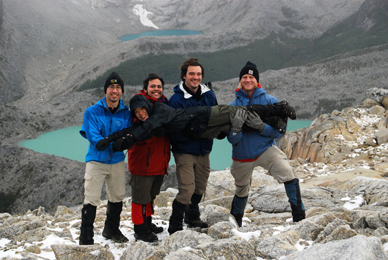Kellogg School of Management
The hallmarks of a NOLS Patagonia course are exploration, remoteness and tough weather. These conditions help build the NOLS leadership skill known as tolerance for adversity and uncertainty. The learning transfers readily from backcountry to business for members of a Professional Training custom expedition for Kellogg School of Management. After his trip to Patagonia, student Peter Schmidt wrote an article for a Kellogg publication called The Merger. Here is what he had to say:
With the sky just beginning to lighten in the east, Dan Balcauski’s headlamp shifted away from his gas stove as he asked, “Wait, you want me to put the cream cheese right on top of this?” The NOLS instructor was making breakfast a couple feet away, protected by the same tarp from the early morning snow.
“Absolutely,” was the reply, “It’ll thicken it right up and trust me, you’ll need the energy today – and everyone knows that cream cheese is basically pure energy.”
Despite not being entirely convinced that he wanted his breakfast any thicker at all, Dan knew how many calories the group had burned through over the previous days, and thought of the energy that would be demanded during the upcoming day’s hike. Reaching a quick conclusion, there was only the slightest hesitation before Dan proceeded to add cream cheese to what had, until that point, been a perfectly acceptable peach cobbler.
Several days prior, the members of the 2011 Kellogg Patagonia trip had arrived in Balmaceda, Chile, with great expectations regarding the trek that lay ahead. Patagonia, a wild, isolated region of southern Chile and Argentina, provided the ideal opportunity to trade the confines of Jacobs for the open skies of the Andes.
However, the challenges that would be faced in order to experience the full splendor of Patagonia were also appreciated – during a dinner of asado chileno and caldillo de pescado it was recognized that the next twenty-some meals would be prepared over a tiny gas camping stove, using dehydrated food supplies which had been carried for kilometers over unforgiving terrain.
Yet that was the very appeal of the Patagonia experience; of being in the back-country and leaving the ‘front-country’ behind, even if for only a short period. After leaving the NOLS campo for the Rio Avellano region the only truly set plan was to return eight days later.
Every day, people made decisions that would impact the entire group – sometimes in a minor way (cream-cheese in peach cobbler), and yet many times in a far more significant manner.
There are no trails or shelters in this part of Patagonia, so each ‘Leader of the Day’ established a route, based on a topographic map and the day’s targeted campsite, and then determined when to hike and when to stop and hydrate, what rivers to cross, which forests to bushwhack through and where to send scouts in case of unexpected obstacles.
These decisions were made quickly by using the strengths of the team – our NOLS instructors had years of backcountry experience and Kellogg students brought their own insights. Yet sometimes it came down to just making a call – how hard should someone be pushed just to achieve another kilometer? When was it time to step back and let more experienced individuals take over, which was the case when a blizzard caught the group exposed while crossing a mountain pass. Patagonia provided a new lens through which to focus years of theoretical and practical team experience.
And what a spectacular lens Patagonia provided. During the eight days, the trek climbed from a river valley through untouched forest and alpine meadows, with the craggy starkness of the Andes stretched out ahead. Looking down from a recently ascended mountain passes, glacial lakes nestled at the base of sheer granite faces – whenever they could be seen through the snow and mist that enveloped the highest regions.
Consistently, group members would look around at the environment, and then at each other, in recognition of not only the splendor of our surroundings, but of the teamwork and effort that it had taken to experience it.
Topics:


